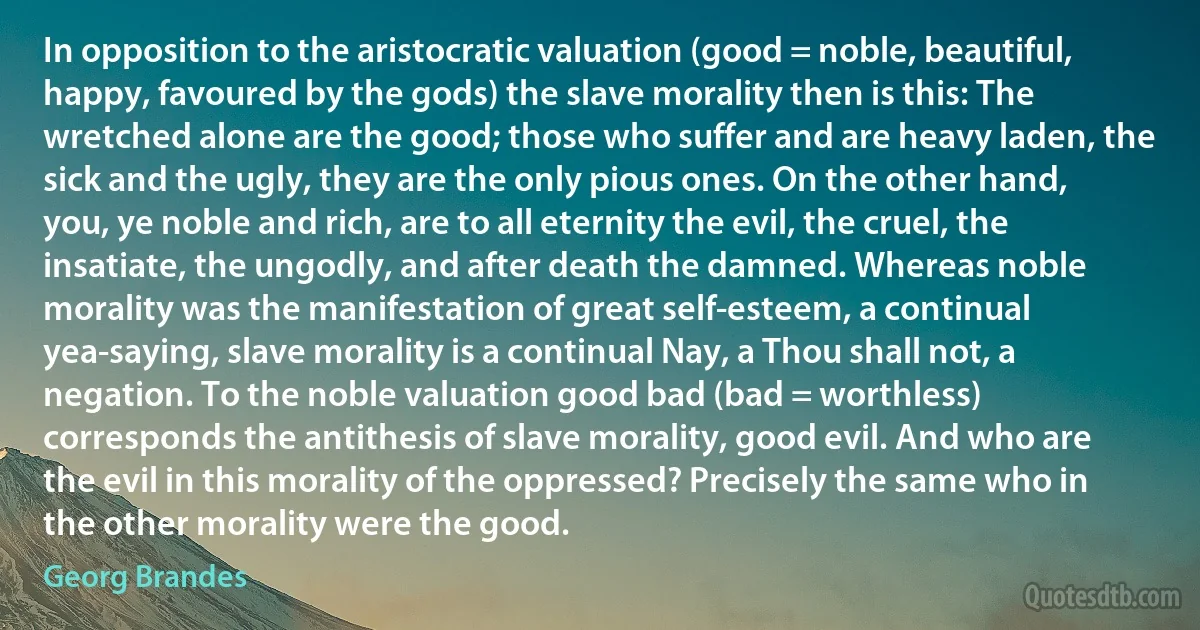
In opposition to the aristocratic valuation (good = noble, beautiful, happy, favoured by the gods) the slave morality then is this: The wretched alone are the good; those who suffer and are heavy laden, the sick and the ugly, they are the only pious ones. On the other hand, you, ye noble and rich, are to all eternity the evil, the cruel, the insatiate, the ungodly, and after death the damned. Whereas noble morality was the manifestation of great self-esteem, a continual yea-saying, slave morality is a continual Nay, a Thou shall not, a negation. To the noble valuation good bad (bad = worthless) corresponds the antithesis of slave morality, good evil. And who are the evil in this morality of the oppressed? Precisely the same who in the other morality were the good.
Georg BrandesRelated topics
antithesis bad beautiful death evil good great happy heavy manifestation noble ones rich self-esteem sick slave thou ugly valuation godsRelated quotes
By the end of the decade it had become obvious that perhaps the one constant of our variegated and strung-out peer groups was a pervasive sense of self-consciousness that sent us in grouchy packs to ugly festivals just to be together and dig ourselves and each other, as if all of this meant something greater than that we were kids who liked rock 'n' roll and came out to have a good time, as if our very styles and trappings and drugs and jargon could be in themselves political statements for any longer than about fifteen stoned seconds, even a threat to the Mother Country! So we loved and loved and doted on ourselves and our reflections in each other even as the whole thing got out of hand and turned into mud and disaster areas and downs and death.

Lester Bangs
We shall not flag or fail. We shall go on to the end. We shall fight in France, we shall fight on the seas and the oceans, we shall fight with growing confidence and growing strength in the air, we shall defend our island, whatever the cost may be. We shall fight on the beaches, we shall fight on the landing grounds, we shall fight in the fields and in the streets, we shall fight in the hills we shall never surrender.... And if, which I do not for a moment believe, this island or a large part of it were subjugated and starving, then our empires beyond the seas, armed and guarded by the British Fleet, will carry on the fight, until in Gods own time the new world in its power and might steps forth to the rescue and liberation of the old.

Winston Churchill
The professional administrators - especially those at higher levels - serve key roles at the boundary of the organization, between the professionals inside and interested parties - governments, client associations, and so on - on the outside. On the one hand, the administrators are expected to protect the professionals' autonomy, to "buffer" them from external pressures. On the other hand, the administrators are expected to woo these outsiders to support the organization, both morally and financially. Thus, the external roles of the manager-maintaining liaison contacts, acting as figurehead and spokesman in a public relations capacity, negotiating with outside agencies-emerge as primary ones in professional administration.

Henry Mintzberg
In ressentiment morality, love for the "small,” the "poor,” the "weak,” and the "oppressed” is really disguised hatred, repressed envy, an impulse to detract, etc., directed against the opposite phenomena: "wealth,” "strength,” "power,” "largesse.” When hatred does not dare to come out into the open, it can be easily expressed in the form of ostensible love-love for something which has features that are the opposite of those of the hated object. This can happen in such a way that the hatred remains secret. When we hear that falsely pious, unctuous tone (it is the tone of a certain "socially-minded” type of priest), sermonizing that love for the "small” is our first duty, love for the "humble” inspirit, since God gives "grace” to them, then it is often only hatred posing as Christian love.

Max Scheler
Postumus was clever: he guessed that this would make Cato angry enough to forget himself. And Cato rose to the bait, shouting out with a string of old-fashioned curses that in the days of his ancestor, whose memory this stammering imp was insulting, woe betide any child who failed in reverence to his elders; for they dealt out discipline with a heavy hand in those days. Whereas in these degenerate times the leading men of Rome gave any ignorant oafish lout (this was for Postumus) or any feeble-minded decrepit-limbed little whippersnapper (this was for me) full permission-
Postumus interrupted with a warning smile: "So I was right. The degenerate Augustus insults the great Censor by employing you in his degenerate family. I suppose you have told the Lady Livia just how you feel about things?"

Robert Graves
